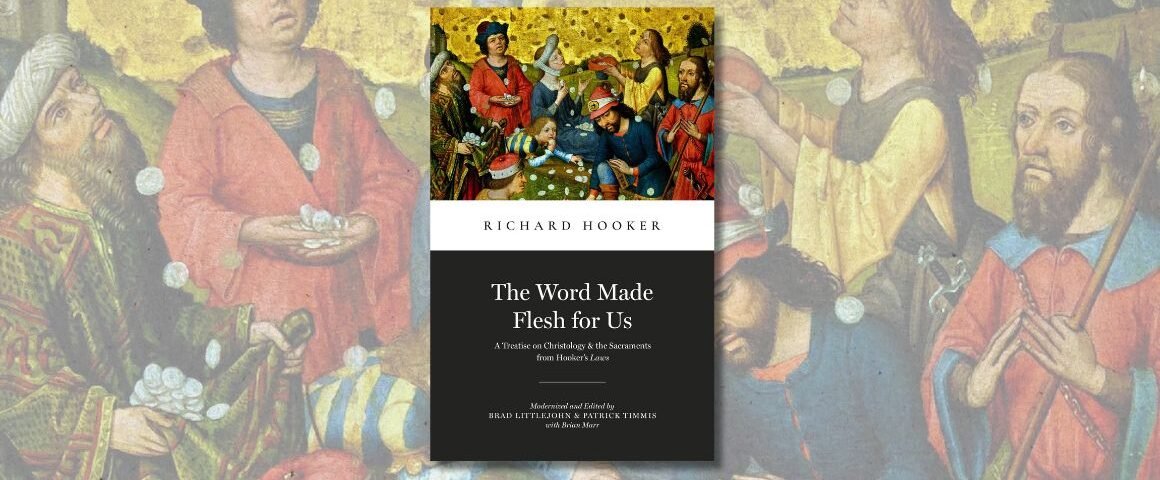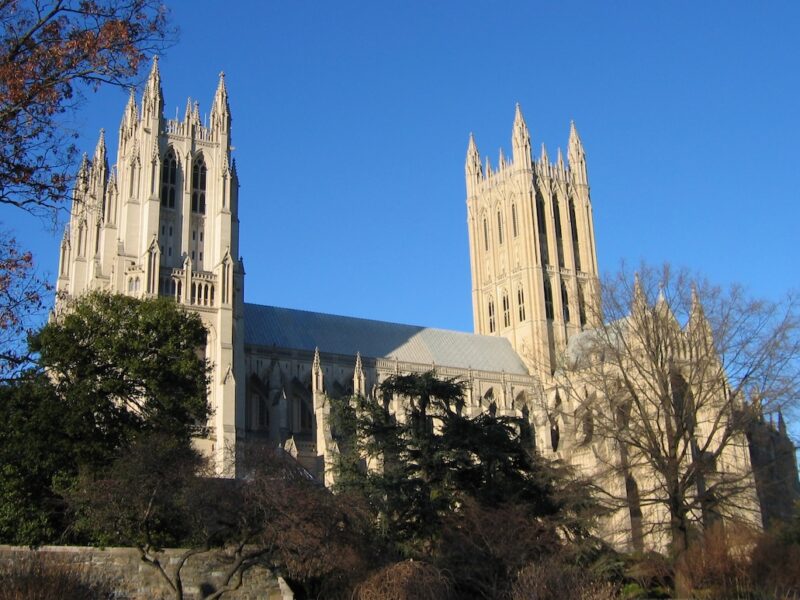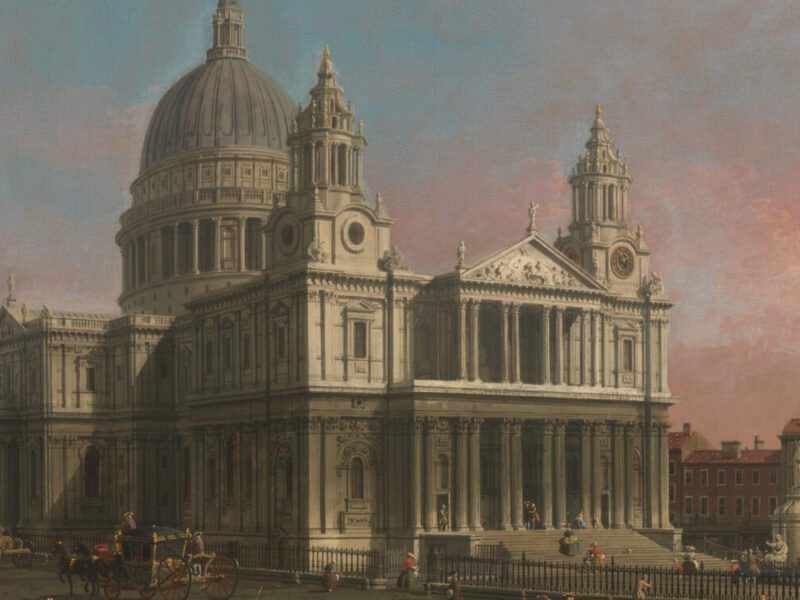The Word Made Flesh for Us: A Treatise on Christology & the Sacraments from Hooker’s Laws. By Richard Hooker. Modernized & Edited by Brad Littlejohn and Patrick Timmis. Davenant Press, 2024. 125 pp. Paperback $19.95.
It has often been observed that the Anglican tradition, unlike some of the other forms of Protestantism, was named for a place (i.e., England) rather than for its founder (e.g., Martin Luther for Lutherans or Jean Calvin for Calvinists). Part of that difference is that despite the significant historic roles of the Tudor monarchs or the masterful liturgy of Archbishop Cranmer, we Anglicans do not have a single figure in such a founding role. No single figure in the early days of Anglicanism set the pace for the tradition as a whole. Yet, if one had to be chosen, Richard Hooker would likely qualify. Hooker’s influence is largely due to the success of his most important work: The Laws of Ecclesiastical Polity, in which he defends the Church of England, in conformity with the Elizabethan Settlement, against accusations from those we would later call Puritans that the reforms of the Church had not gone far enough.
Though the Laws were once considered essential reading for an educated English speaker, they have sadly fallen out of use, even among Anglicans. Part of this sad state of affairs is the difficulty of Hooker’s prose, even for its day. Enter Dr. Brad Littlejohn and the Davenant Institute.
I have been reading and reviewing the volumes Littlejohn’s modernization project of Richard Hooker’s Laws of Ecclesiastical Polity since the publication of the initial volume in 2016. The first four volumes, covering the Preface and Books I through IV of the Laws, were completed by 2018. In 2019, an omnibus edition consisting of a slightly edited version of the Preface through Book IV was released. Like many others, I have been eagerly awaiting Book V for more than half a decade. The present volume will certainly please many (including me). Yet, I have anecdotally encountered numerous people disappointed that this latest volume only covers chapters 50 through 60 along with chapters 66 and 67 of Hooker’s Book V.
Many, like me, did not encounter Hooker in seminary beyond the hackneyed “Three-Legged Stool” analogy that has been misattributed to the Laws (Hooker never uses that illustration, nor do his writings support the idea that scripture, tradition, and reason are of equal weight). As such, I suspect that many people are unaware that Book V is larger than the Preface through Book IV combined. Indeed, most editions of the Laws publish the latter as “Volume 1” with Book V as a standalone “Volume 2.”
In the introduction to The Word Made Flesh for Us, the editors note that research indicates that Hooker did not originally intend to make Book V so large. Rather, “he initially penned a relatively short Book V that offered a positive exposition of the basic principles and elements of liturgical theology” that would have only been about twice as long as any of the earlier Books (xiv‒xv). Yet, pressured by friends, colleagues, and even students, Hooker added chapter after chapter addressing specific Puritan objections to the established worship practices of the Church of England. The present volume is more akin to Hooker’s original intentions, and as such will appeal to a greater general audience today. Book V as Hooker eventually published it would largely be of interest only to historians or students of Anglican liturgy, such as myself. Thankfully, the editors expressed an intention to publish the rest of Book V, as well as Books VI‒VIII over the coming years (ii).
As the subtitle indicates, The Word Made Flesh for Us specifically focuses on the chapters of Book V that address Christology and Sacramental Theology. The chapters of the present volume are labeled to reflect The Word Made Flesh for Us as a standalone volume as well as to show their sequence within the full Book V. Roman numerals are used for the former, and Arabic numerals for the latter. Hooker begins the published section (chapter 50) by defining Sacraments. While there is nothing unfamiliar to a student of the historic Anglican Formularies in Hooker’s definition, of note is his focus on the Sacraments as being specifically ecclesiastical. That is, God has given them to the Church as a whole rather than to individual Christians. Furthermore, as the sacraments are only used in this life, but concern the life to come, they must focus on Christ the only mediator between the Creator and creation (2‒3).
Because of this Christ-centered focus, the next six chapters carefully discuss Christology, including: Christ’s divinity and incarnation (chapter 51), the ancient Christological heresies (chapter 52), the two natures of Christ (chapter 53), the glorification of Christ’s humanity (chapter 54), the question of whether Christ’s human nature is omnipresent (chapter 55), and the mystical union between Christ and the Church (chapter 56). Most of these chapters are rather conventional explanations of the Christology we get from the first four Ecumenical Councils and their creeds. Yet, Hooker considers this review of Chalcedonian Christology as essential for discussing Sacramental Theology. Particularly, the debates between Reformed, Lutheran, and Roman Catholic Eucharistic Theology hinge on Christology.
This is where chapter 55, on the question of the omnipresence of Christ’s human nature, becomes controversial. Chapter 55 makes a classically Reformed case that Christ’s human nature retains its essential humanity, and is thus incapable of being omnipresent, despite its inseparable union with Christ’s divine nature, and the resulting gifts such a union brings. “Supernatural gifts are an advancement, not an extinguishment, of that nature to which they are given. The substance of Christ’s body therefore neither has, nor can it have, a non-local presence” (40). Indeed, to have such a non-local presence would be to make it something other than a human nature; omnipresence is a unique property of God’s divine nature.
So, is it a confusion of Christ’s two natures (in violation of the principles defined in the Council of Chalcedon) to claim that Christ’s body is ubiquitous or omnipresent in its human nature? I.e., are the Lutheran and Roman Catholic understandings of the Eucharist as consisting of Christ’s body in a corporeal or physical sense flirting with Christological heresy? Despite being firmly Reformed in his understanding of Christ’s human body being locally present only in Heaven, Hooker would not quite go as far as to call Lutherans or Roman Catholics Christological heretics. Since we can affirm that Christ is indeed substantially omnipresent through his divine nature, and that the divine nature and human nature are simultaneously distinct and inseparable, there is a sense in which Christ’s divinity always brings his humanity with it. After all, there is only one Christ, not two. Hooker puts it like this: “For the actual position of Christ’s manhood is restrained and tied to a certain place; it is only the conjunction with deity that extends as far as deity. Yet presence by way of conjunction is a sort of presence” (42, emphasis in the original).
The rest of the book shifts a focus from Christology to Sacramental Theology proper. Chapter 57 discusses the necessity of the Sacraments to the life of both the Church and the individual Christian. Chapter 58 discusses the Rite of Baptism and is followed by two chapters on the necessity of Baptism as a command of Christ that conveys true spiritual benefits. Chapters 61‒65 are omitted from the present volume, as they deal with minutiae of then-contemporary controversies over Baptism that would be of little interest to a modern general audience. Chapter 66 discusses Confirmation, not as a sacrament in of itself, but as an extension of Baptism, and as a means for fully realizing Baptism’s benefits. The chapter on Confirmation is particularly needed for contemporary Anglicans (as well as other Protestants), since we are often confused about the meaning of Confirmation and about the need for such a rite to have been retained. Contra the canard from the last few decades, Confirmation is not a “rite in search of a theology” even if we do not consider it to be on the same sacramental level as Baptism and the Eucharist.
The final chapter discusses the Eucharist, comparing the three general opinions then present: Reformed, Lutheran, and Roman Catholic. Hooker repudiates accusations aimed at the Reformed view as being bare symbolism; he acknowledges that all three parties agree that the worthy communicant truly receives Christ’s Body and Blood through the Sacrament. Yet he also argues against Lutheran and Roman Catholic understandings of Christ’s presence in the Eucharist as being localized or corporeal, for all the reasons discussed in Chapter 55. Indeed, he sees the Lutheran and Roman Catholic positions as “unnecessary for our mystical communion with Christ” (120), for they are overcomplicated to the point that “their writing is hungry and unpleasant, tedious and laborious, heartless and till now fruitless” (122). Why focus on the question of how Christ is present in the Eucharist rather than focusing on the benefits worthy communicants receive from his presence and the promises attached to the Sacrament? Acknowledging that even the Fathers were often in disagreement about the details of how Christ is present in the Sacrament, he sees the common elements (viz. a true but spiritual communion) to be of inestimable comfort:
[W]hen we read or hear both ancient and modern divines on those points where all speak unanimously (regardless of their opinions of the controversial points), their words are heavenly and sweet as the honeycomb, their tongues melodiously tuned instruments, their sentences full only of consolation and joy. Is this not itself almost a voice from heaven showing us the safest position to hold? (122)
Indeed, I find Hooker’s reasoning in these chapters to be similarly sweet. I have noticed that much of the arguments between those who identify as Anglo-Catholic versus those who identify as “Reformation Anglicans” tend to rehash arguments from the late Victorian era through the turn of the last century. From such arguments it often seems that one is faced with a binary choice between some sort of Transubstantiation (though rarely named as such) or a sort of “real absence” (again, not named as such). This is simply not how the 16th and 17th century English Divines thought, despite (or, perhaps, because of) remaining within the general Reformed camp of the day. Rather, they sought to be faithful to the Scriptures without being overly speculative or overly philosophical about the issue. While I would expect many modern Anglicans to quibble with Hooker, his position is probably the best-articulated version of what might be anachronistically called “mainstream” Anglicanism of the Elizabethan and Jacobean eras. Indeed, I find myself breathing something of a sigh of relief when I read Hooker’s Christology and Sacramental Theology. It is elegant, comforting, and the best explanation of our Formularies’ position that I have yet to read.
To that end, The Word Made Flesh For Us would be an ideal book for a small-group study or even for a follow-up study after a membership class. Indeed, I would not hesitate to use it (and other volumes in the series) in adult Christian education of all kinds. While The Word Made Flesh For Us is indeed beyond simple catechesis, it is only just. It should certainly be required reading for clergy, prospective clergy, and licensed lay ministers. I cannot recommend it highly enough. Like the other volumes in the Hooker modernization project (and indeed all of Davenant’s “Library of Early English Protestantism”), The Word Made Flesh For Us goes a long way in reintroducing Anglicans and other English-speaking Protestants to the best of their Reformation-era roots.





'Book Review: The Word Made Flesh For Us' has no comments
Be the first to comment this post!